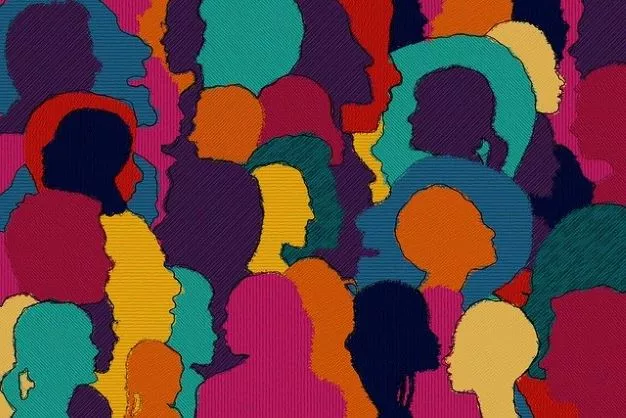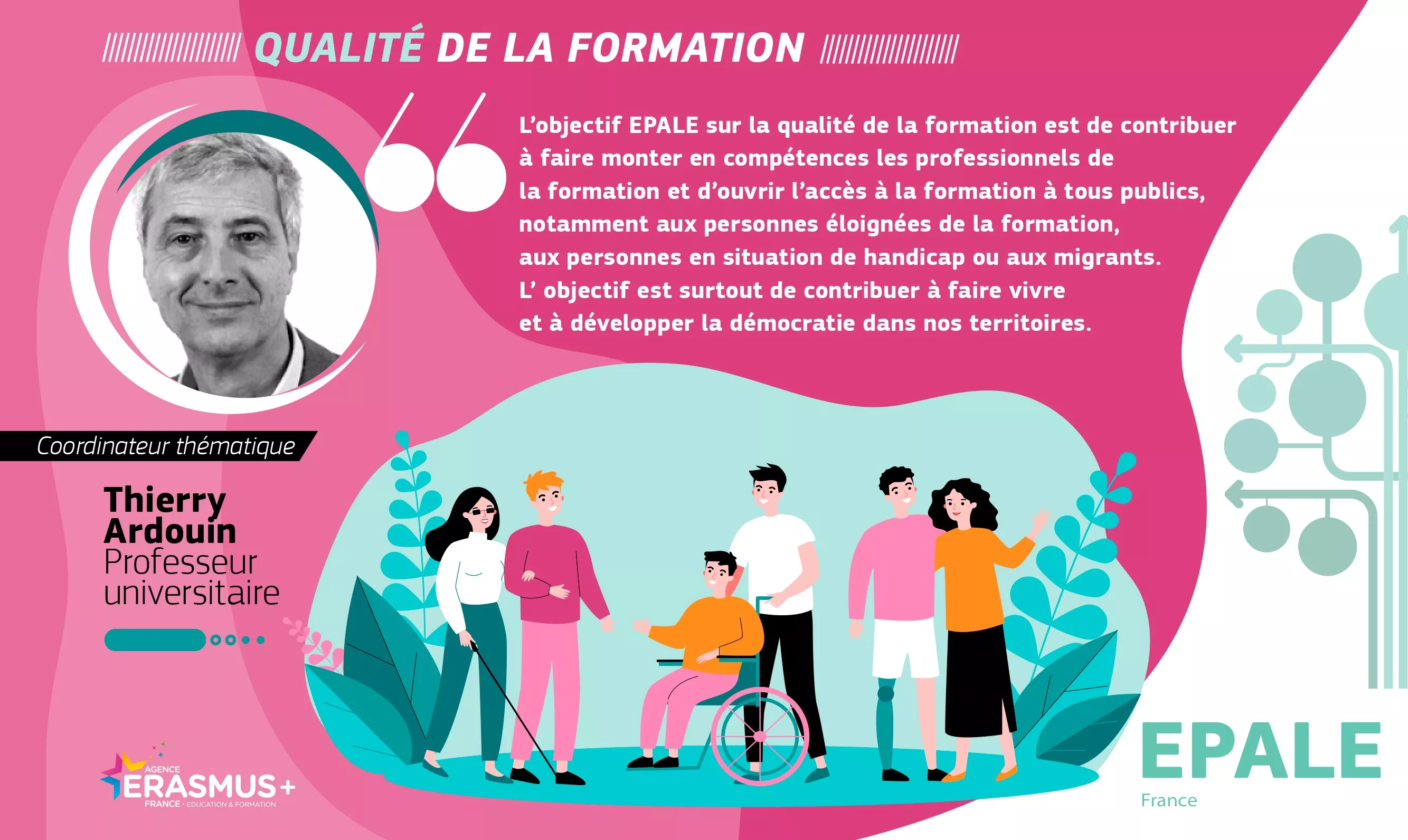A teacher, consultant and interpreter's views on intercultural competence

[Translation : EPALE France]
Interview with Lawrence Atilade, a teacher, consultant and interpreter, on intercultural competence
Issues of interculturalism, interculturality and intercultural competence are increasingly prominent. Based on your background, your research and the projects you have carried out, I would like to find out more and share your experience on these intercultural issues.
These themes are important for the education and training professionals and stakeholders who meet on the EPALE platform, the Erasmus+ platform for adult learning.
To begin, can you tell us a little about yourself?
I have a Master's degree in Political Philosophy from Paris IV Sorbonne and a Master's degree in Language Education Engineering from Jean Monnet University in Saint Etienne. I used to teach French as a Foreign Language (FLE), and I am a consultant, teacher and interpreter (French - English) by profession.
I am currently a doctoral student at CIRNEF (Interdisciplinary Centre for Education and Training in Normandy). My research focuses on the intercultural competence of teachers of French as a foreign language in English-speaking sub-Saharan Africa, and more specifically in Ghana.
Thierry Ardouin: Can you tell us how you have encountered interculturality in your personal, academic or professional life?
On a personal level, without wanting to question Abdallah Preceille's thesis suggesting that interculturality is acquired, I would say that it is very much rooted in my personal and social history, and even appears to me to be almost natural.
I was born in the French-speaking part of Côte d'Ivoire, where more than 60 different ethnic groups and cultures are intermingled. My parents come from two English-speaking African countries with a strong multicultural anchorage (Ghana and Nigeria).
In my work, I regularly use five languages: French, English, Yoruba (the main language of Nigeria), Twi (the main language of Ghana) and Pidgin (West African Creole English). I believe that living and working in a multilingual environment where difference does not make a difference at all, has allowed me to integrate and accept linguistic and cultural mixing with simplicity and objectivity. I shifted between multilingual and bilingual contexts, and became involved in cultural communities as an interpreter early on. This is a secondary activity that I am still working in today, in socio-medical interpreting.
Academically speaking, my background as a political scientist and linguist in France has given me the keys to intellectual flexibility, which are necessary in opening up to the world. These are the elements that triggered my interest in interculturality.
Thierry Ardouin: What led you to work on the issue of interculturality and intercultural competence?
I would like to note here the nuance that should be made between cultural competence presented as “knowledge about” a country, an ideology, and intercultural competence which is communication “with the other”.
Every speaker carries at least one culture which, when in contact with other cultures, can generate resistance of all kinds. In communities and interaction, Margalit Cohen-Emerique speaks of cultural shocks, of cultural misunderstanding. In an increasingly globalised and threatening world, how can we reduce, minimise, or even avoid (if this is even possible) conflicting with otherness, and reduce the gap between our culture of origin and the culture hosting us?
For me, this involves a deep reflection on the aspiration for peace and social cohesion of our contemporary societies, which are weakened by indifference. This constantly requires me to remember the urgency of a peaceful dialogue between cultures. The challenge of intercultural harmony and interconnection relies on the inevitable development of intercultural competence in justice and truth for the general good.
This is where I fully agree with Byram: in developing the skill of commitment as the determining key to intercultural competence.
Thierry Ardouin: In a Master's thesis, you take up Bouchet's work, can you remind us of these principles?
Dominique Bouchet (1995) formulated principles that may be useful because of both the theoretical and practical approach to the issue of formulating intercultural competence. In enumerating the principle, Bouchet stressed that:
- no one is a “typical” member of their culture;
- no culture exists in a “closed” and “homogeneous” form;
- no one is a member of a single ‘isolated’ group and our identity is determined in relation to members of other groups;
- every culture is a form of ‘transmission’ of its values and models, which may be subject to excessive transformation, and may therefore be, to varying degrees, a ‘process’ by nature;
- no one ‘receives’ their identity in a definitive and unchanged form.
Intercultural competence also encompasses the skills to:
- facilitate effective functioning in a culturally diverse world;
- communicate and create spaces and conditions for the intermingling of people and cultures;
- organise life in such a way as to ensure harmonious coexistence and introduce new members of different origins and denominations.
Intercultural competence is conceived as a set of capabilities and can be summarised in three principles:
- Knowing oneself by forging one's own identity;
- Knowing the other as oneself by overcoming cultural prejudices;
- Stepping away from the idea of a definitive identity (openness, welcome and understanding)
What major idea would you like to emphasise for students or future generations?
I would remind them that building a career path or a career cannot happen in a blissful individualism. We have to invent and reinvent ourselves tirelessly through intercultural curiosity, the desire to discover, to “go towards the other”.
I would remind them that in this world, as we are losing or searching for meaning, it is not only vital to open up to diversity but also to allow oneself to be penetrated by this openness to increase and consolidate their employability. Amartya Sen speaks of empowerment.
I would remind them that the effectiveness and success of our common endeavours and struggles against sectarian, nationalistic, ethnocentric and protectionist tendencies will depend on our intercultural capacity to develop our knowledge, skills, learning, understanding and commitment.
Can you give us an author, a book and/or a reference that has guided you or marked you?
It would be difficult for me to quote just one author, as the field of interculturality is so vast. However, I would recommend the works of Milton Bennett (1986, 2004, 2017) on the development of intercultural sensitivity, to which I would add Jean Claude Beacco's “Les dimensions culturelles des enseignements de langues”. In my approach, it is first and foremost a matter of transmitting, raising awareness and training in intercultural matters.
Thierry Ardouin: Thank you very much for sharing your experience and thoughts
[1132 words]
A teacher, consultant and interpreter's views on intercultural competence
Interview with Lawrence Atilade by Thierry Ardouin, an EPALE expert
Interview with Lawrence Atilade, a teacher, consultant and interpreter, on intercultural competence
Issues of interculturalism, interculturality and intercultural competence are increasingly prominent. Based on your background, your research and the projects you have carried out, I would like to find out more and share your experience on these intercultural issues.
These themes are important for the education and training professionals and stakeholders who meet on the EPALE platform, the Erasmus+ platform for adult learning.
To begin, can you tell us a little about yourself?
I have a Master's degree in Political Philosophy from Paris IV Sorbonne and a Master's degree in Language Education Engineering from Jean Monnet University in Saint Etienne. I used to teach French as a Foreign Language (FLE), and I am a consultant, teacher and interpreter (French - English) by profession.
I am currently a doctoral student at CIRNEF (Interdisciplinary Centre for Education and Training in Normandy). My research focuses on the intercultural competence of teachers of French as a foreign language in English-speaking sub-Saharan Africa, and more specifically in Ghana.
Thierry Ardouin: Can you tell us how you have encountered interculturality in your personal, academic or professional life?
On a personal level, without wanting to question Abdallah Preceille's thesis suggesting that interculturality is acquired, I would say that it is very much rooted in my personal and social history, and even appears to me to be almost natural.
I was born in the French-speaking part of Côte d'Ivoire, where more than 60 different ethnic groups and cultures are intermingled. My parents come from two English-speaking African countries with a strong multicultural anchorage (Ghana and Nigeria).
In my work, I regularly use five languages: French, English, Yoruba (the main language of Nigeria), Twi (the main language of Ghana) and Pidgin (West African Creole English). I believe that living and working in a multilingual environment where difference does not make a difference at all, has allowed me to integrate and accept linguistic and cultural mixing with simplicity and objectivity. I shifted between multilingual and bilingual contexts, and became involved in cultural communities as an interpreter early on. This is a secondary activity that I am still working in today, in socio-medical interpreting.
Academically speaking, my background as a political scientist and linguist in France has given me the keys to intellectual flexibility, which are necessary in opening up to the world. These are the elements that triggered my interest in interculturality.
Thierry Ardouin: What led you to work on the issue of interculturality and intercultural competence?
I would like to note here the nuance that should be made between cultural competence presented as “knowledge about” a country, an ideology, and intercultural competence which is communication “with the other”.
Every speaker carries at least one culture which, when in contact with other cultures, can generate resistance of all kinds. In communities and interaction, Margalit Cohen-Emerique speaks of cultural shocks, of cultural misunderstanding. In an increasingly globalised and threatening world, how can we reduce, minimise, or even avoid (if this is even possible) conflicting with otherness, and reduce the gap between our culture of origin and the culture hosting us?
For me, this involves a deep reflection on the aspiration for peace and social cohesion of our contemporary societies, which are weakened by indifference. This constantly requires me to remember the urgency of a peaceful dialogue between cultures. The challenge of intercultural harmony and interconnection relies on the inevitable development of intercultural competence in justice and truth for the general good.
This is where I fully agree with Byram: in developing the skill of commitment as the determining key to intercultural competence.
Thierry Ardouin: In a Master's thesis, you take up Bouchet's work, can you remind us of these principles?
Dominique Bouchet (1995) formulated principles that may be useful because of both the theoretical and practical approach to the issue of formulating intercultural competence. In enumerating the principle, Bouchet stressed that:
- no one is a “typical” member of their culture;
- no culture exists in a “closed” and “homogeneous” form;
- no one is a member of a single ‘isolated’ group and our identity is determined in relation to members of other groups;
- every culture is a form of ‘transmission’ of its values and models, which may be subject to excessive transformation, and may therefore be, to varying degrees, a ‘process’ by nature;
- no one ‘receives’ their identity in a definitive and unchanged form.
Intercultural competence also encompasses the skills to:
- facilitate effective functioning in a culturally diverse world;
- communicate and create spaces and conditions for the intermingling of people and cultures;
- organise life in such a way as to ensure harmonious coexistence and introduce new members of different origins and denominations.
Intercultural competence is conceived as a set of capabilities and can be summarised in three principles:
- Knowing oneself by forging one's own identity;
- Knowing the other as oneself by overcoming cultural prejudices;
- Stepping away from the idea of a definitive identity (openness, welcome and understanding)
What major idea would you like to emphasise for students or future generations?
I would remind them that building a career path or a career cannot happen in a blissful individualism. We have to invent and reinvent ourselves tirelessly through intercultural curiosity, the desire to discover, to “go towards the other”.
I would remind them that in this world, as we are losing or searching for meaning, it is not only vital to open up to diversity but also to allow oneself to be penetrated by this openness to increase and consolidate their employability. Amartya Sen speaks of empowerment.
I would remind them that the effectiveness and success of our common endeavours and struggles against sectarian, nationalistic, ethnocentric and protectionist tendencies will depend on our intercultural capacity to develop our knowledge, skills, learning, understanding and commitment.
Can you give us an author, a book and/or a reference that has guided you or marked you?
It would be difficult for me to quote just one author, as the field of interculturality is so vast. However, I would recommend the works of Milton Bennett (1986, 2004, 2017) on the development of intercultural sensitivity, to which I would add Jean Claude Beacco's “Les dimensions culturelles des enseignements de langues”. In my approach, it is first and foremost a matter of transmitting, raising awareness and training in intercultural matters.
Thierry Ardouin: Thank you very much for sharing your experience and thoughts
*****
Ressources :
Abdallah-Pretceille, Martine. « Chapitre II - Les archipels de l’interculturel », Martine Abdallah-Pretceille éd., L'éducation interculturelle. Presses Universitaires de France, 2017, pp. 94-117.
Beacco, J-C. (2000). Les dimensions culturelles des enseignements de langues. Paris : Hachette
Bennett, M. J. (2017). Development model of intercultural sensitivity. In Kim, Y. (Ed.), International Encyclopedia of Intercultural Communication. Hoboken, NJ: John Wiley & Sons.
Bennett, M. J. (2004). Becoming interculturally competent. In J.S. Wurzel (Ed.), Toward Multiculturalism: A Reader in Multicultural Education. Newton, MA: Intercultural Resource Corporation.
Bennett, M. J. (1986). A developmental approach to training for intercultural sensitivity. International Journal of Intercultural Relations, 10(2), 179–196.
Bouchet, D. (1995). « Ambiguïté dans la communication interculturelle. Dans la dimension culturelle dans International Marketing, Odense : Odense University, tel que cité dans Korporowicz, L. (1997). Multiculturalisme et interculturalisme : de la réaction à l'interaction.
Cohen-Emerique, Margalit. (2015) Pour une approche interculturelle en travail social. Théories et pratiques. Presses de l’EHESP, 2015.





